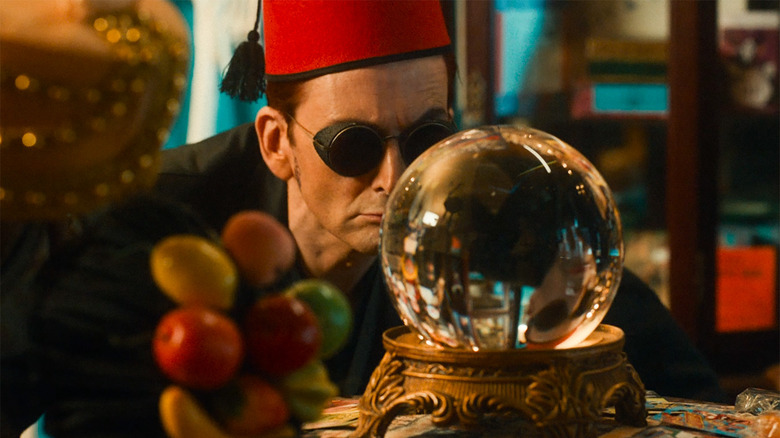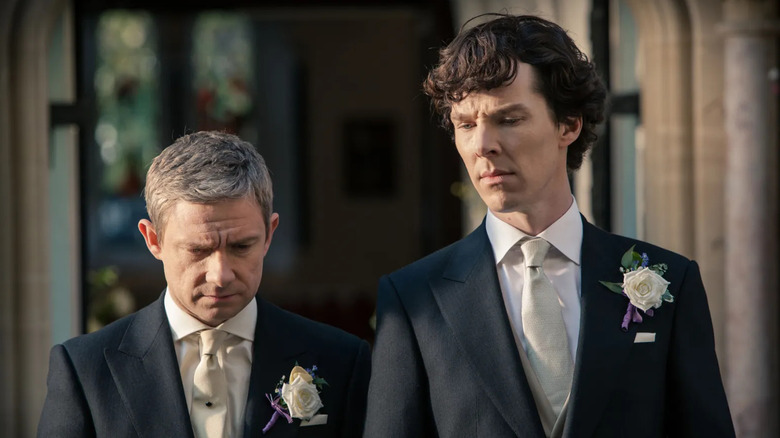Good Omens Season 2's Doctor Who Connections Go Beyond A Few Easter Eggs
This article contains spoilers for "Good Omens" season 2.
There's a lot of overlap between the "Good Omens" and "Doctor Who" fanbases. After all, Crowley is played by David Tennant, the same guy who played (and is now playing again) the time-traveling alien Doctor. If that wasn't enough, "Good Omens" also co-stars Michael Sheen as Aziraphale, an actor who played the malevolent alien House in the "Doctor Who" episode "The Doctor's Wife." That episode was written by Neil Gaiman, co-creator and showrunner of "Good Omens." Director Douglas MacKinnon has also worked on both shows.
"Good Omens" season 2 takes the connections between the shows even further. Peter Davison, who played the fifth Doctor back in 1982, shows up here to play the biblical figure Job. Job's son, Ennon, is played by David Tennant's real-life son, Ty Tennant, who also happens to be Peter Davison's grandson. The fly Beelzebub gives Gabriel is described as "bigger on the inside," much like the Doctor's TARDIS. When Aziraphale wants to convince a neighbor to go to the Wickber Street Traders and Shopkeepers Association Monthly Meeting, he bribes him with an unprinted 1965 "Doctor Who" annual. And when they visit another shopkeeper, Crowley gets distracted by a fez (because fezzes are cool).
Beyond the Easter eggs and talent crossovers, the similarities are just in the vibes. Both are British shows that feature otherworldly beings who struggle to connect to regular humans. Like the Doctor, Aziraphale and Crowley are both way older than they appear, have powers we all wish we could have, and are constantly forced to protect regular people from forces we're blissfully unaware of. Both shows also have a strong LGBTQ+ fandom and a heavy shipping culture. Just as "Doctor Who" fans were constantly shipping the Doctor with their companion, the "Good Omens" fandom is constantly shipping Crowley with Aziraphale. The difference is that "Good Omens" seems more committed to giving the fans what they want.
A not-so-subtle love story
"Good Omens" season 2 centers around two main storylines: Aziraphale and Crowley needing to take care of memory-wiped Gabriel (Jon Hamm), and the angel/demon duo needing to manipulate neighbors Nina (Nina Sosanya) and Maggie (Maggie Service) into falling in love. The first storyline alone is already loaded with queer subtext, as the angel and demon are forced to act as parents to the helpless, childlike Gabriel. The second storyline is even more loaded, since Crowley and Aziraphale are drawing on their own feelings for each other when trying to trick Nina and Maggie into falling in love. Even Crowley's plan to ambush them with a sudden rainstorm so that they have to take shelter under an awning is a callback to Aziraphale sheltering him from the rain with a wing during their first hangout on Earth.
There's another "Doctor Who" reference of sorts in the back end of "Good Omens" season 2: Crowley's assertion to Aziraphale that the two of them "don't dance." For Whovians, this line was reminiscent of that season 1 episode "The Doctor Dances," where the speculation over whether the Doctor dances or not serves as a not-so-subtle metaphor for whether the doctor has sex (or at the very least, whether he's capable of romance). In "Good Omens," the demon and angel do in fact end up dancing, shortly after pressuring Nina and Maggie to dance in their scheme to make them fall in love.
A game-changing finale
The approach to queer characters in "Good Omens" feels similar to "Doctor Who," for better or worse. The Tennant years of "Doctor Who" were filled with queer representation, but so much of it was implied. It's easy to see how a casual viewer who hadn't watched "Torchwood" could make it through the first four seasons of "Doctor Who" without ever realizing that Jack Harkness was seriously pansexual, for instance, or that the Doctor was flirting with him in half their interactions. Other minor characters were implied to be LGBTQ+, but it was almost always done in a way that could fly over viewers' heads.
In "Doctor Who," the coyness was understandable — this was a family program in the mid-2000s — but in "Good Omens," it feels a little stranger. It's 2023 and it's dedicating a whole season-long arc to two female characters falling in love, so why does it initially feel like it's afraid to be explicitly queer? Though there's no doubt that Maggie and Nina are attracted to women, words like "lesbian" or "bisexual" are never used.
This criticism is actually addressed when Maggie and Nina confront Crowley about his relationship with Aziraphale, in which the constant use of the term "partner" throughout the season is given multiple meanings. Crowley has been deluding himself into thinking he and Aziraphale are partners in crime, or maybe partners in friendship, but Maggie and Nina force him to admit they're also partners in love. In other words, they're urging Crowley to finally make the show's subtext text — and Crowley actually listens.
A lot of fans were frustrated by the finale, which cruelly tears Crowley and Aziraphale apart, but there's plenty to celebrate here. Not only is it (hopefully) the show's plan to give them a happier ending in season 3, but when Crowley kisses Aziraphale, the writers have already given us more than "Doctor Who" ever could.
Forget Doctor Who: what about Sherlock?
Then again, perhaps BBC's "Sherlock" is the more relevant show. Whereas "Doctor Who" generally centers around a male Doctor in a (sometimes) romantic dynamic with his female companion, "Sherlock" was always centered around two guys. Like the duo at the heart of "Good Omens," John and Sherlock were constantly teased by other characters on the show for seeming like a gay couple. Famously (and tragically), many fans convinced themselves that the show was planning to follow through on the possible foreshadowing; when season 3 came along and the show started referencing JohnLock shippers, many took this as confirmation of the show going down a queer route. (The most likely explanation is that the showrunners never had any intention of doing this, and that their references to #Johnlock were simply there to make fun of the fans.)
The moment many of the JohnLock shippers fully gave up hope was in the season 3 finale: John and Sherlock are being separated seemingly for good, and it seems like Sherlock is about to confess something to John before he leaves. The script builds it up like he's about to give a declaration of his love ... only for Sherlock to make a meaningless joke about John and Mary's choice for a baby name.
Nine years later, "Good Omens" would find itself in a similar position in "Chapter 6: Every Day." But this time, when one of the characters has their chance to confess their love, to make a whole show's worth of queer subtext canon, "Good Omens" actually follows through. It's given the viewers what they want, haters be damned. For "Good Omens" fans who'd previously suffered through seven years of queerbaiting from "Sherlock," this season 2 finale is its own little miracle.



